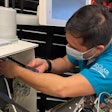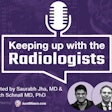
The physical appearance of radiology residency candidates in their application photographs could affect whether they're asked for an interview, according to a study published May 28 in Academic Medicine.
The findings confirm that there's an appearance bias in the selection process and that it must be addressed, lead author Dr. Charles Maxfield of Duke University in Durham, NC, told AuntMinnie.com via email.
"We undertook the study because we feared that obese and less attractive applicants were disadvantaged in applications to residency programs and probably more broadly throughout higher education," he said. "This is well studied in the business world, but they have some justification for it: in sales, for instance, attractiveness has been shown to correlate with success. But there is no justification for it in medicine or anywhere in higher education."
Well-documented phenomenon
Forming opinions of others based on appearance is a well-documented phenomenon, and not only in the business world, Maxfield and colleagues noted. Bias crops up in the admissions process in higher education as well, especially since most graduate school applications require a photograph.
 Dr. Charles Maxfield.
Dr. Charles Maxfield.So how might bias show up in the selection of radiology residents?
To find out, Duke researchers assessed for appearance-based discrimination by setting up a simulated resident selection process. Seventy-four faculty from five academic radiology departments reviewed mock residency applications between September and October 2017. The applications included demographic information and stock photos that represented people across a range of facial attractiveness and obesity. Applications also included randomized academic variables.
The 74 reviewers considered 5,447 applications, each of which included one of 76 baseline identities. These were selected by a panel of eight radiologists (four male, four female; five white, two Asian, and one African American) to represent diversity across gender (53%, 47% female), race/ethnicity (35% white, 32% Asian, 29% African American, and 4% Latino), facial attractiveness (22% more attractive, 43% neutral, 34% less attractive), and obesity (52% not obese and 48% obese). The reviewers were asked to review a minimum of 50 applications and rank each applicant for interview desirability on a scale of 1 to 5 (least desirable to most desirable).
Maxfield and colleagues found that Step 1 scores on the U.S. Medical Licensing Examination (USMLE) proved the highest predictor of reviewer rating, with a correlation coefficient for interview desirability of 0.35 (the higher the coefficient number, the more correlation for desirability). Facial attractiveness strongly predicted higher interview desirability ratings for proposed residents, Maxfield's team found, with attractive versus unattractive candidates having a correlation coefficient of 0.3 and neutral versus unattractive candidates having a correlation coefficient of 0.13. The researchers also found other factors affected whether an applicant would be invited for an interview:
| Factors predicting desirability of residency candidates | |
| Correlation coefficient | |
| Step 1 USMLE scores | 0.35 |
| Attractive facial features | 0.3 |
| Race/ethnicity | 0.25 |
| Preclinical class rank | 0.25 |
| Clinical clerkship grades | 0.23 |
| Unattractive facial features | 0.13 |
| Obese vs. not obese | -0.14 |
The results were surprising in their magnitude, Maxfield said.
"It did not totally surprise us that the physical appearance of the applicant influenced the resident selection process," he said. "But we didn't anticipate the magnitude of the influence. The facial attractiveness of the applicant, as presented in the application photograph, was more important than clinical clerkship grades, preclinical class rank, and research publications. It was more important than every application factor we studied except the USMLE Step 1 exam score and race. Obesity wasn't quite as important, but it was still on par with those traditional academic metrics."
Mitigating bias
How can this bias be mitigated? Doing away with the application photograph may not be the answer since the bias influences the interview as well, Maxfield told AuntMinnie.com. But resident selection committees need to develop strategies to identify and manage appearance-based bias.
"As for mitigation, I think the key is simply awareness," he said. "We all lack awareness of our biases based on physical appearance."




















